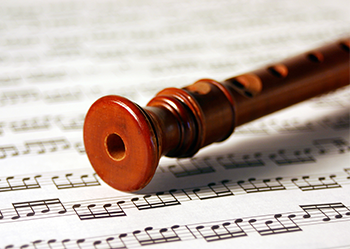University News Last updated 03 April 2024

A blind recorder player who performed with Coldplay at the closing ceremony of the London 2012 Paralympic Games says it can be “challenging” being a disabled musician and is backing a Birmingham City University (BCU) research project aimed at making music accessible for everyone.
“I’m a professional musician and just happen to be blind,” said James Risdon, a founder member of the British Paraorchestra and Access Lead at the Associated Board of the Royal Schools of Music.
“I know how exhausting it can be. Not only do you have to be good at what you do, there are additional practical things to consider, such as travel and existing away from home and familiar surroundings and support.
“There are musical issues, too, such as having music in accessible formats and having time to prepare it. Then there are things that others rarely need to think about, such as can I access backstage, how can I find my way from the venue to where I am staying, where can I get food?
“Some things are just the challenges of having a disability, but other things are artificial barriers that could be removed with some imagination and thought.”
The research project, which also involves Imperial College London and The OHMI Trust, is being funded by the Arts and Humanities Research Council (AHRC). It will explore the wider issues of underrepresentation and discrimination within education and employment.
Dr Victoria Kinsella-Hadjinestoros, from the Birmingham Music Education Research Group (B-MERG) at BCU, is playing a leading role in the research.
“Our aim is to create inclusive practices in music and reshape methodologies to benefit people in the wider community, as well as professionals and academia,” she said. “By connecting researchers, policy makers, practitioners and industry professionals, we can explore diverse challenges and their impact on education. We can also address barriers faced by disabled musicians.”
In the UK, 13.3 million people are disabled, which equates to 21% of the population.
Two recent surveys highlight some of the challenges they face when attempting to access music.
In 2020, 80% of disabled people surveyed by national charity Youth Music said music making was a positive experience. However, 52% said they could not find a teacher to meet their needs, 25% didn't know how to source an adapted instrument, and 67% cited financial reasons as a barrier to access. In addition, 27% of music hubs questioned did not offer adapted equipment for loan.
In 2019, a survey of nearly 100 deaf and disabled musicians across the UK found that concert venues are frequently failing to provide adequate access and facilities.
Of the respondents to the survey by Attitude is Everything, 70% said they had kept their disability hidden because of worries it would damage a relationship with a venue, promoter or festival, while two thirds said they had to “compromise their health or wellbeing” to be able to perform live.
The AHRC project involving BCU has already held the first of four planned meetings.
In November, music hubs, universities from the UK, instrument makers from the Netherlands and Germany met with the UK Association for Music Education, Music Mark and several disabled musicians at Royal Birmingham Conservatoire (RBC), which is part of BCU.
Rachel Wolffsohn, General Manager at The OHMI Trust, said: “This was a valuable event that initiated conversations around music and disability between people who wouldn't normally meet. It was interesting to hear everyone’s views, especially those who joined us from overseas.”
RBC student Emma Brown is also participating in the research. Like James, she is disabled.
Studying for an MA in Music for Performance, Emma said: “As a musician and an amputee, I have a lot to say about music and disability. I believe there are two fundamental elements that need to change: attitudes and access. I would love to make music equal.”
Emma says she chose RBC because if offers good accessibility as well as a quality education.
“Sadly, that’s not always the case,” she said. “I want to see people and organisations think about accessibility before they have a disabled musician join. With the connections this project has, we can give disabled musicians a voice and make noise in the music industry to create change.”
James added: “I hope this research shines a light on what everyone is doing so we can collaborate. Music brings us together. We have shared interests, networks and opportunities. If we speak with one voice, the music business - and world at large - will listen and take note.”
Upcoming events will focus on instruments in digital and mechanical form, adapted instruments and equipment, accessibility in orchestras and concerts, and music accessibility in education.
Find out more about the AHRC networking project.